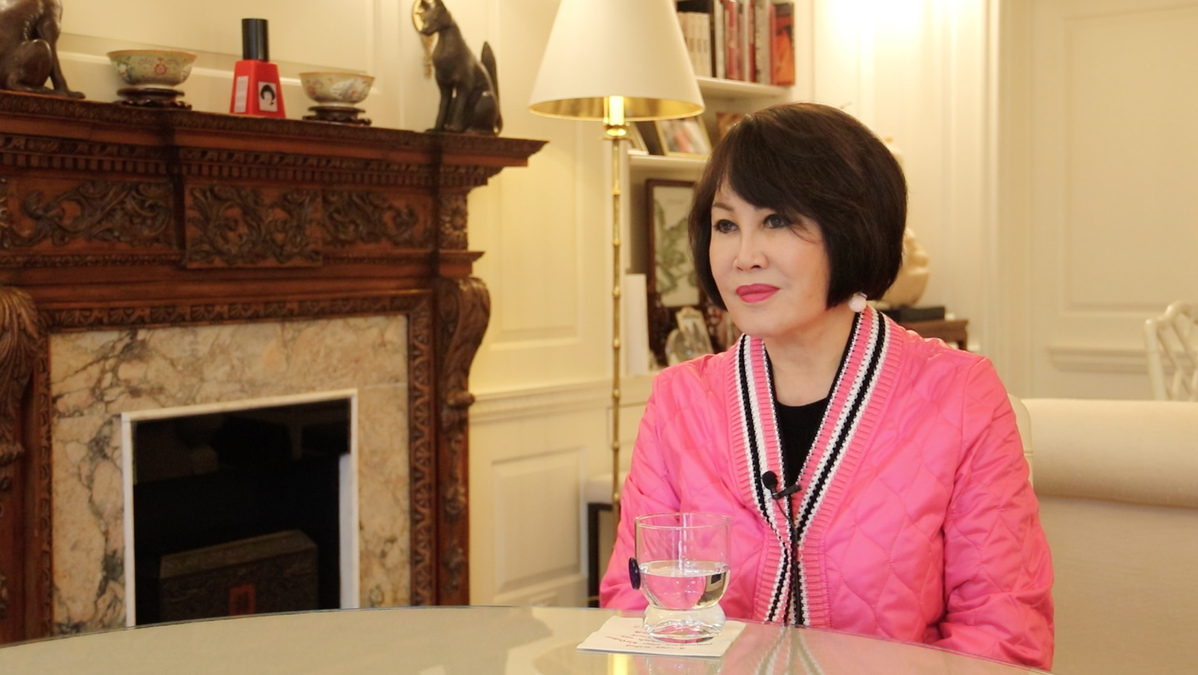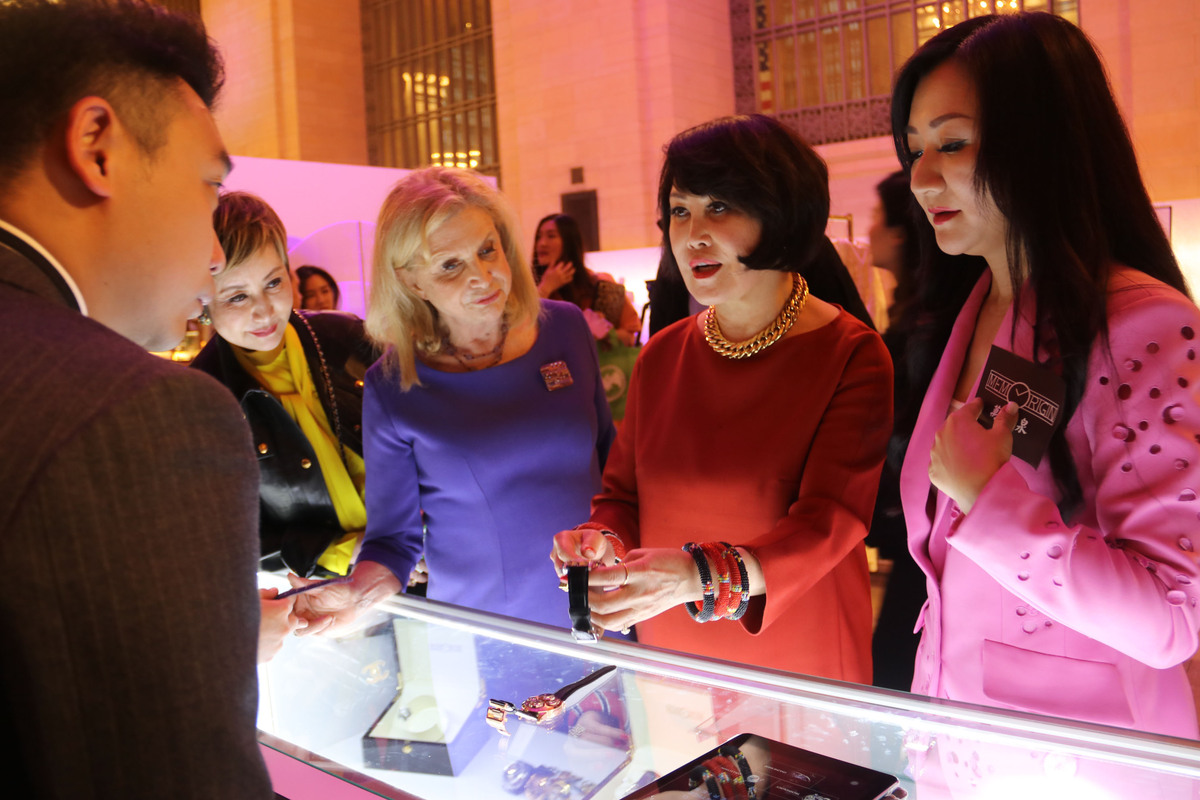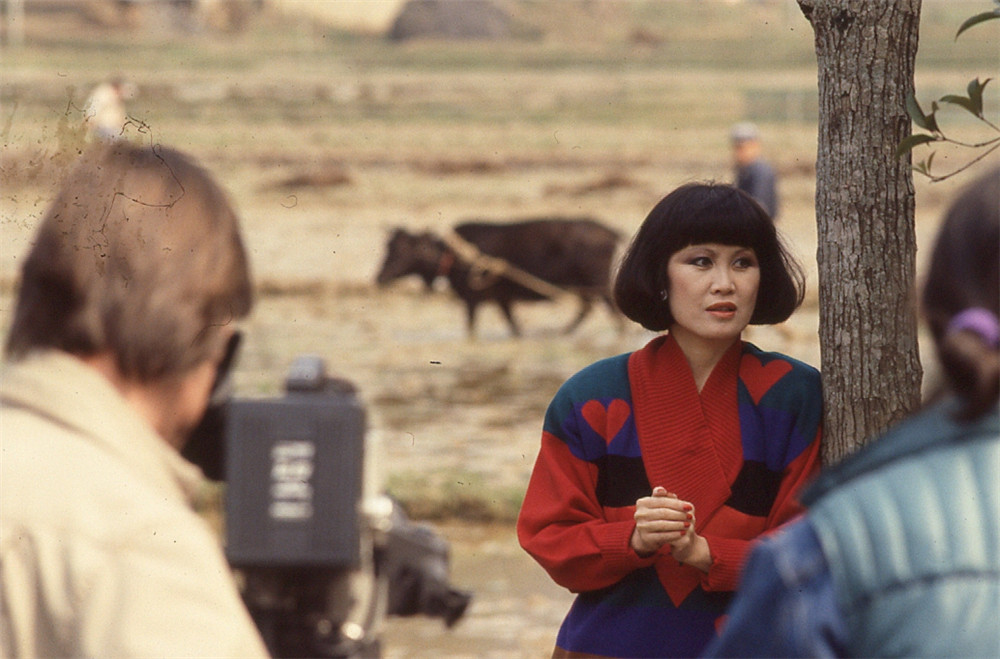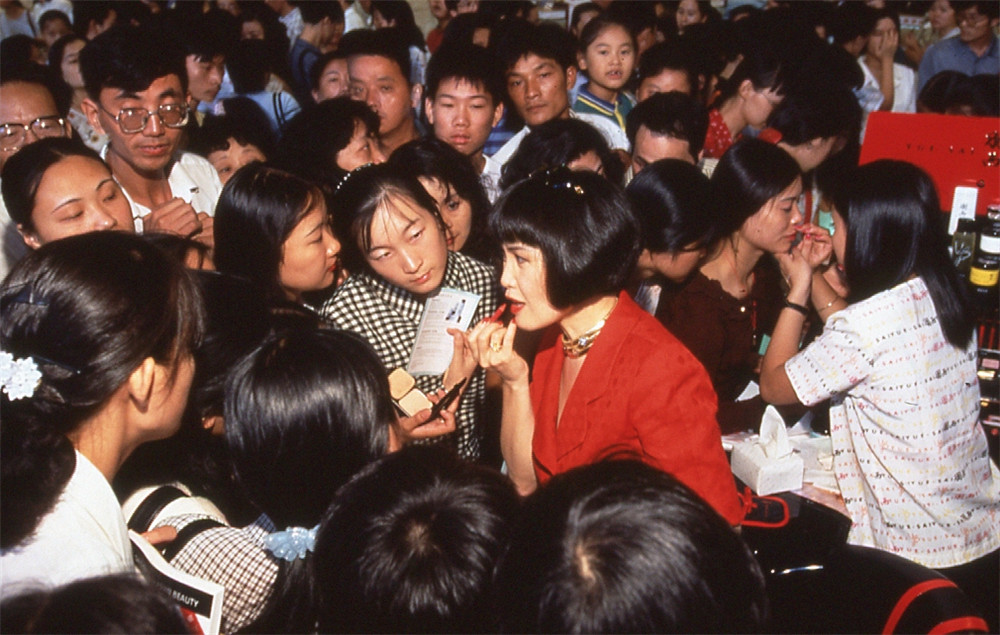
Yue-Sai Kan takes an interview at her home in midtown Manhattan, New York on April 18, 2019. [Photo by Judy Zhu/China Daily]
Television anchor Yue-Sai Kan has made a career out of helping China and the US get closer
For many Americans, the first time they ever saw a live television broadcast from China was in 1984, when China's 35th National Day celebration aired live on PBS for two hours.
TV host and producer Yue-Sai Kan, who had already created a show about Asia, was the anchor of the historic live broadcast.
The program was also historic for being the first joint venture between a Chinese station — China Central Television (CCTV) — and a US one, PBS.
"It was very impactful because [it was] Americans' first time seeing China," said Kan.
Born on the Chinese mainland, raised in Hong Kong, college-educated in the US and with experience in television in the 1970s, Kan got the assignment from PBS when the network realized that the live feed from China would have no narration.
"If you didn't know a lot about China, you couldn't even begin to do this event," said Kan, who had only two days to prepare for the broadcast.
The anniversary celebration in China featured a lot of elements that were "uniquely Chinese," according to Kan. Not only was there a military parade showcasing China's army, navy and air force, there was also a civilian parade through Tiananmen Square that in many ways represented important social changes in China.
"There was a float called 'The No.1 Document' — (yi hao wen jian)," recalled Kan. The document was released by the Chinese government at the beginning of 1984 and was the basis of further agricultural reforms in China — a forerunner of China's reform and opening-up process.
"If nobody translated it, no American — nobody would have known anything about it," said Kan, describing just one of the many gaps between China and the outside world that she has helped bridge.
"If you think about it, Deng Xiaoping says gai ge kai fang (reform and opening-up). If foreigners know nothing about China, or the Chinese know nothing about the outside world, where is kai fang (opening-up)?" said Kan.

Yue-Sai Kan (second from right) talks to venders during the China Chic pop-up event in New York City’s Grand Central Terminal on April 26, 2019. [Photo by Judy Zhu/China Daily]
A large part of Kan's career as an award-winning TV producer and host has been introducing China and the outside world to each other, a role she's an acknowledged pioneer at performing.
When she started the program Looking East, a weekly TV series about Chinese and Asian culture in the 1970s, "Asia, particularly China, was definitely not talked about," Kan said, yet many Asian countries were interested in having people come and get to know them.
The program stayed on the air for 12 years running on dozens of cable stations across the US.
She was also one of the first people to educate the Chinese about the outside world in the 1980s, when her live broadcast with PBS led to an invitation from CCTV to produce a program that showed China audiences other places around the globe.
The 104-episode show called One World featured more than 20 countries and was presented both in English and Mandarin, a ground-breaking experiment for CCTV, which at the time had barely any programs except for newscasts.
CCTV now has more than 40 channels and more than 500 programs, according to Kan.
Kan was invited by Ai Zhisheng, then minister of radio, television and film, to write a book about how she created the programs to educate the Chinese television audience. The book was published in 1987.
Kan also introduced China's TV industry to advertising, which Kan said was non-existent previously, due to a shortage of consumer products to buy.
Kan managed to recruit a group of companies interested in Chinese consumers, including some surprising turnouts like Nestle Café, Coca-Cola and P&G.
"I was really quite skeptical about it" as Chinese people had "always been drinking just tea, and coffee was totally something unknown" at the time, said Kan.
"But amazingly the Chinese really took to Nestle Cafe," said Kan.
"With that, One World became the first television program in history to carry advertising on CCTV on a regular basis. It was historic in that sense too," said Kan.

Kan works on her 1988 documentary Journey Through a Changing China in Guilin, Guangxi Zhuang autonomous region, in 1987. [Photo provided to China Daily]
China was the theme of many other TV programs Kan produced for US networks, one of which won her an Emmy Award. She also ventured into a broad range of industries, introducing new things and ideas to China and bringing Chinese products to the world.
She launched her own makeup brand Yue-Sai in 1992 in China, stepped into the fashion field by bringing Chinese designers and brands to the US and to the world, and has been involved in charities for years.
Starting to do charities in China in the early 80s, Kan said a lot of people thought it was a joke back then. Today people are getting wealthier and "if they are given the right reason, they will support," said Kan.
Fashion, too, is an industry that Kan has put a lot of passion into.
"When I first went to China less than 40 years ago, there was not a word for 'fashion' there, simply because there was none," she said. Everyone wore their hair and clothes the same.
"Today, really due to the opening-up policy of China, due to the ingenuity and the hard work of the people, China is a country that is in the forefront — the country's fashion industry is to be reckoned with," said Kan.
A number of talented fashion designers were starting to shine in China, and Kan took on the role of introducing them to the world through various events.
This year, for example, Kan and her team launched a five-day pop-up sale in New York's Grand Central Terminal starting in April, featuring 20 Chinese brands, many making their first appearance in the US.
Kan said she hoped the brands learned from the process, understanding the US market better and getting recognized by US consumers.
Kan also hosted the annual Chinese Fashion Gala in New York, which she said is "trying to highlight the achievement, the innovation of the Chinese people in this industry".
The 2013 Chinese Fashion Gala, for example, featured the collection of Chinese designer Guo Pei for the first time in America. The designer then created a huge buzz in 2015 when superstar singer Rihanna wore one of her designs to that year's China-themed Met Gala.
"We have to claim credit for bringing her outside of China — she had never left China before," said Kan. "A lot of brands that I know in China that are so good are totally unknown" outside the country.

Yue-Sai Kan demonstrates makeup for customers in a shopping center in Shanghai in 1996. [Photo provided to China Daily]
This year's gala featured young designer Jason Wu, editor-in-chief of Vogue China Angelica Cheung and well-known actress and fashion icon Shu Qi, among others.
The gala is a charity event, with the money collected going to the Yue-Sai Kan China Beauty Fund that was established in 2011 and supports programs in China and America that promote China's fashion industry.
One such program is a scholarship for Chinese students at New York's Fashion Institute of Technology. And this year, a new program is joining the portfolio — a Chinese fashion sustainability program, according to Kan.
That program will bring more than a dozen executives from China to the US to learn how the fashion industry here is going sustainable and how China could go in such a direction, as the industry could be a heavy polluter. The program would also be available online.
For Kan, the program is especially meaningful with China developing into "the largest country producing fashion".
China's development is evident in many ways, as observed by Kan, who had just returned from a trip to the country and marveled at its progress.
"I don't even carry a purse anymore," said Kan, referring to China's mobile purchasing. She said she uses her cell phone for almost every purchase — from small street vendors to even sending red envelopes on holidays.
"I think anybody who goes to China today will feel very, very impressed by this whole thing," said Kan, who says China has come a long way.
A successful China, according to Kan, would also benefit the US as the two countries enter the 40th anniversary of their diplomatic relations. "It's a win-win situation," she said.
"To me it's not a competition, shouldn't be a competition," said Kan. "They just need to learn to work together."
Judy Zhu in New York contributed to the story.

